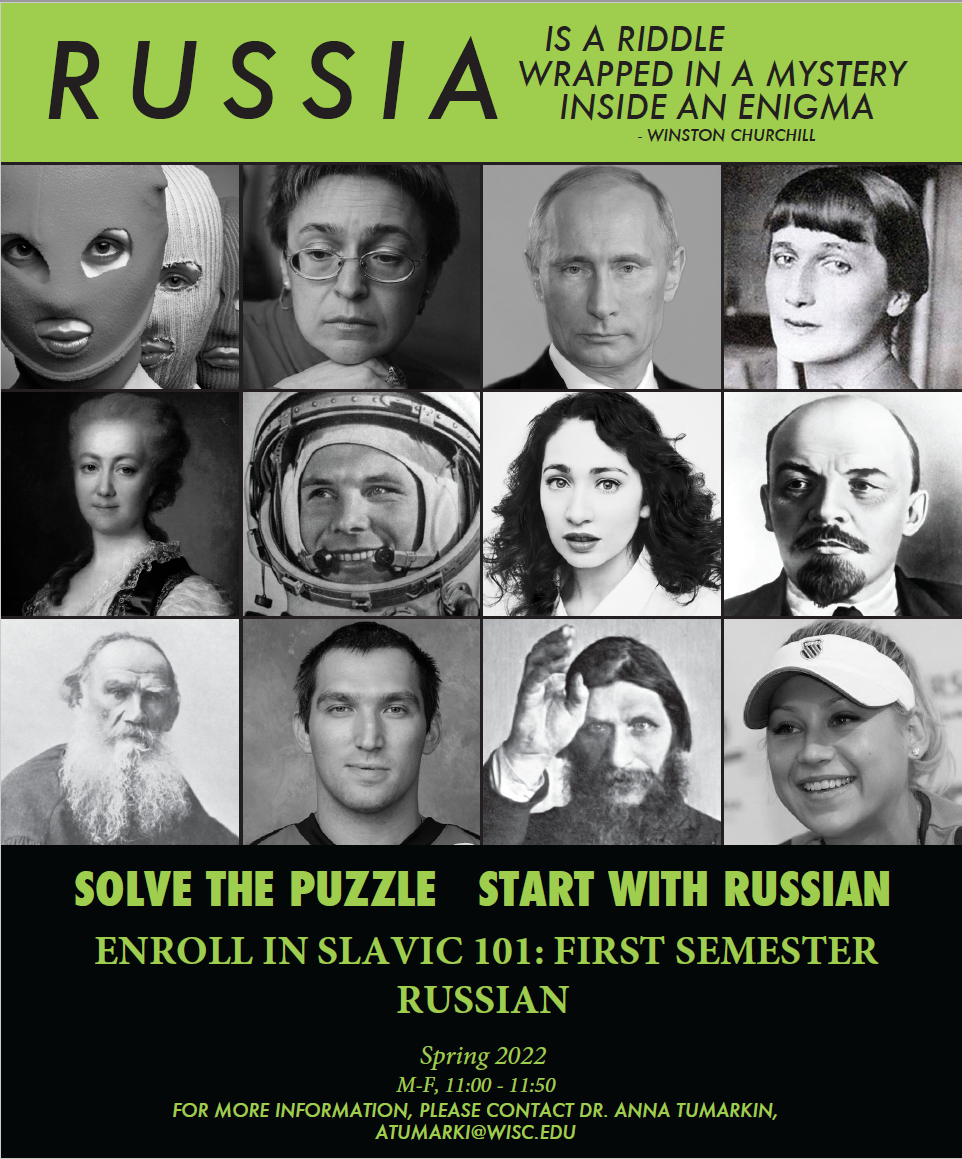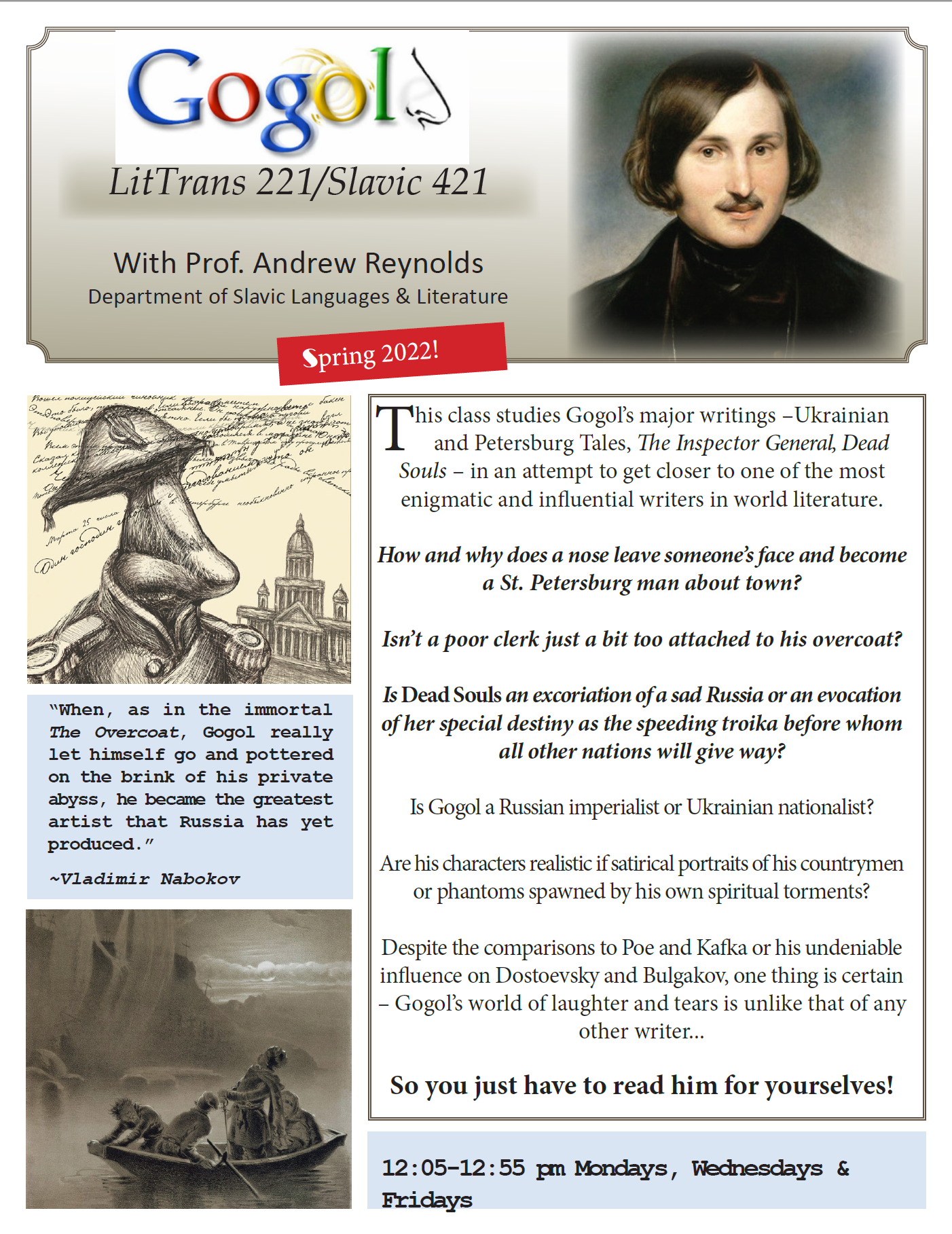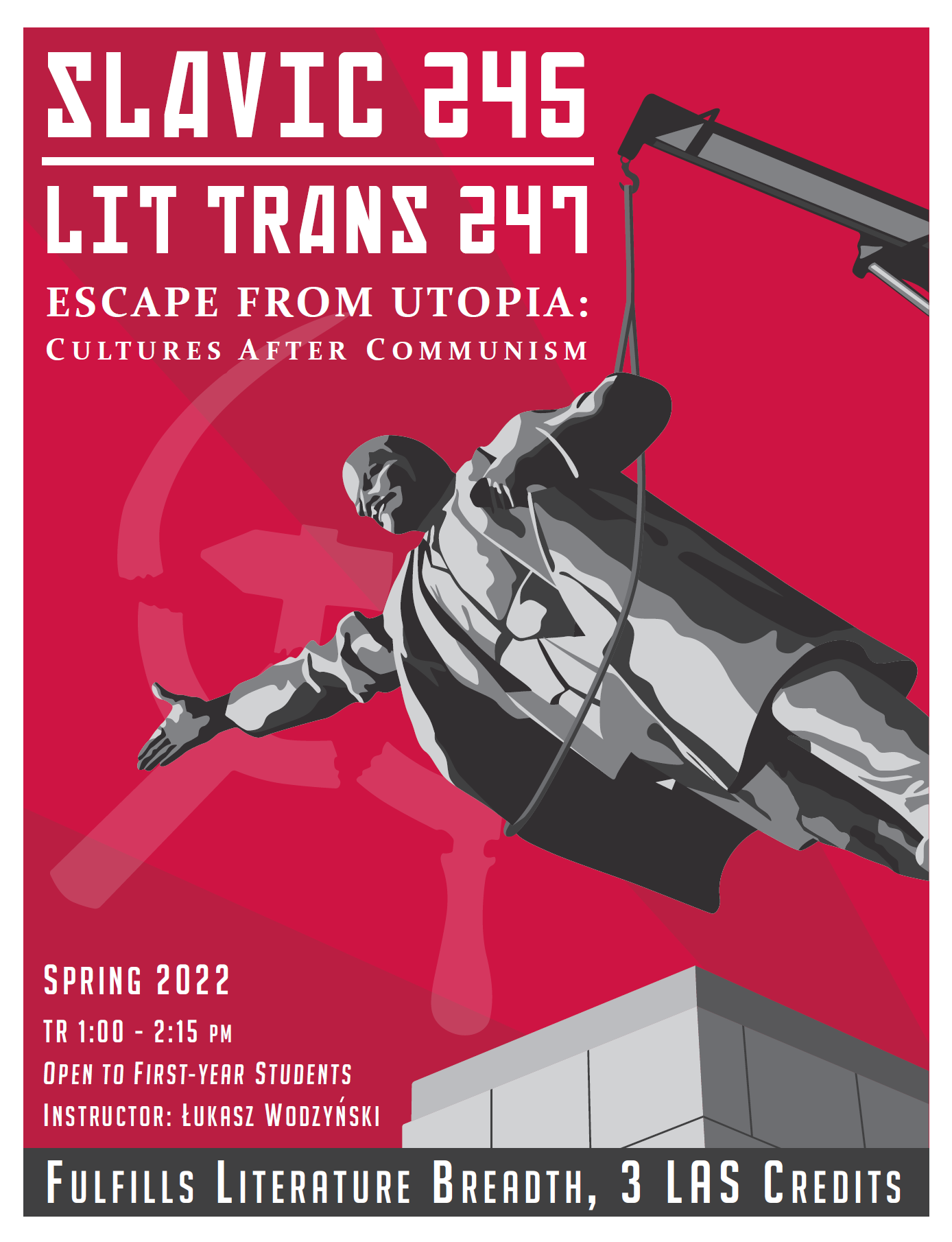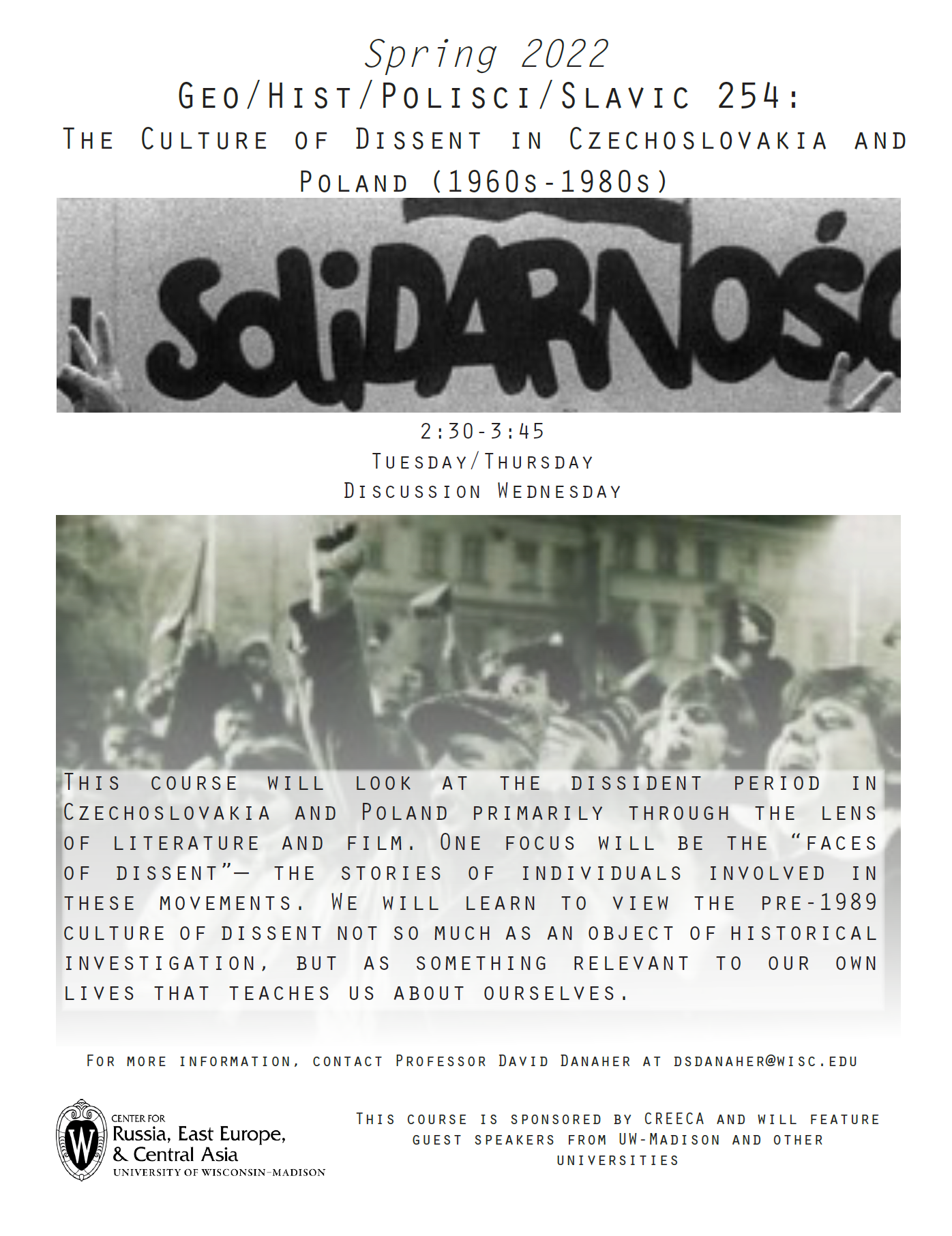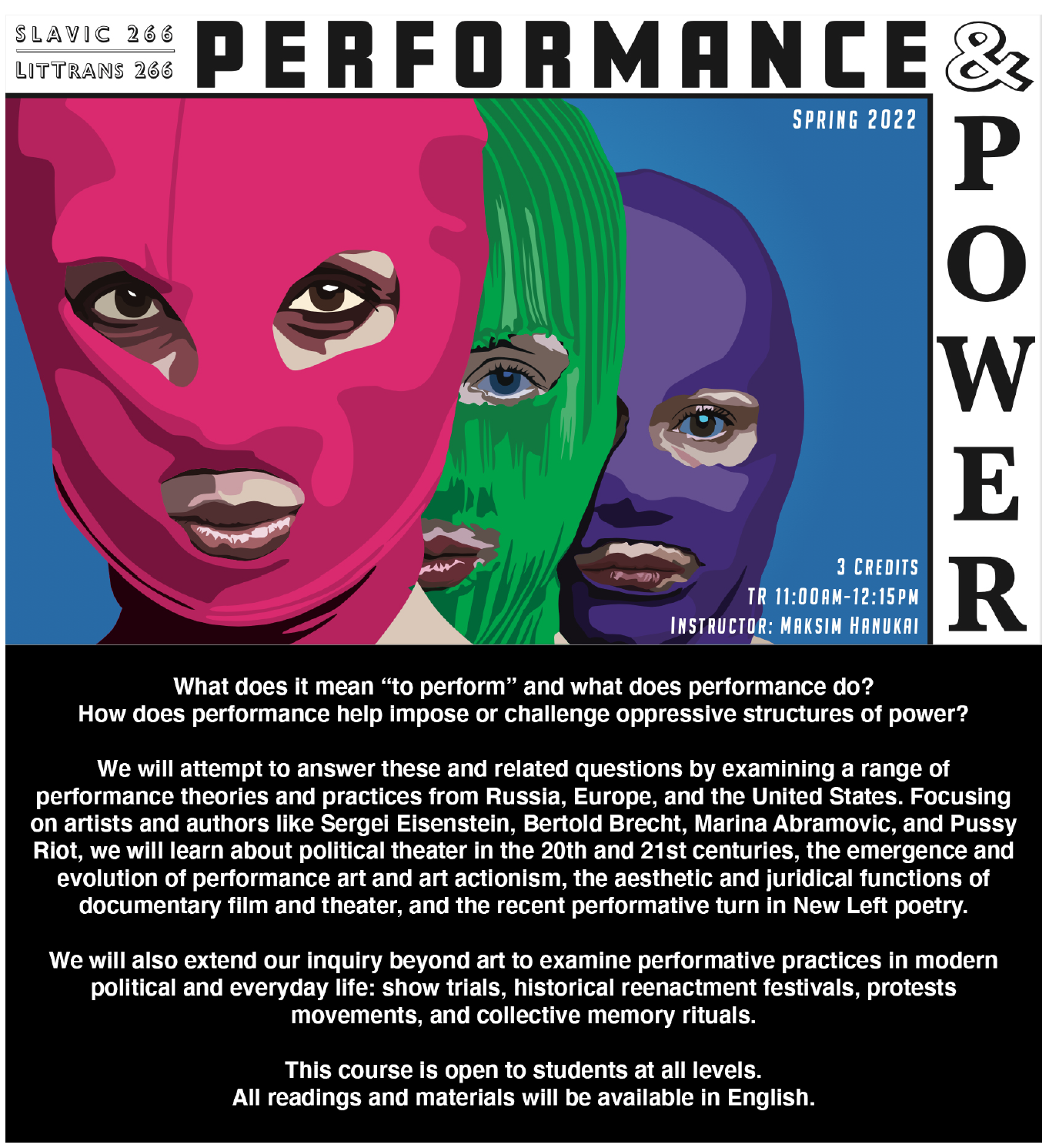SLAVIC 101 – First Semester Russian
Five hours a week focusing on speaking, listening, reading and writing Russian, with an introduction to Russian culture. No previous knowledge of Russian expected.
LITTRANS 221/SLAVIC421 – Gogol
“When, as in the immortal The Overcoat, Gogol really let himself go and pottered on the brink of his private abyss, he became the greatest artist that Russia has yet produced.” Vladimir Nabokov
This course will explore the major fictional texts of Nikolai Vasil’evich Gogol (1809-52) – Ukrainian and Petersburg Tales, The Inspector General, Dead Souls – in an attempt to get closer to one of the most enigmatic and influential writers in world literature Relevant non-fiction texts will also be introduced when appropriate. Despite the comparisons to Poe and Kafka or Gogol’s undeniable influence on Dostoevsky and Bulgakov, one thing is certain – his world of laughter and tears is unlike that of any other writer. Are his characters realistic if satirical portraits of his countrymen, or phantoms spawned by his own spiritual torments? Is Gogol a Russian imperialist or Ukrainian nationalist, both, or neither? Is Dead Souls an excoriation of a sad Russia or an evocation of her special destiny as the speeding troika before whom all other nations will give way?
SLAVIC 247/LITTRANS 245 – Escape from Utopia: Cultures After Communism
The swift collapse of communist regimes across Central and Eastern Europe came as a surprise to both their opponents and political clients. How did culture mediate the experience of this political, social, and economic revolution? How does the experience of communism shape the historiography, identity, and vision(s) of the future of the affected nations? What is the condition of postcommunism? These are some of the questions we will be exploring as we examine Polish, Russian, Ukrainian, Czech, and South Slavic literature and cinema from the decades following the dissolution of the Soviet Union.
SLAVIC 254 – The Culture of Dissent in Czechoslovakia and Poland (1960s-1980s)
The theme of the course will be the culture of dissent in Czechoslovakia and Poland. That is, we will be looking at the “dissident” period in these countries–the 1960s through the late 1980s– primarily through the lens of literature and film, but within a broader interdisciplinary approach. This approach will involve problematizing the notion of dissent by suggesting that it is not tied to one particular time and place (to one historical -ism). Ideally, we will be able to view the subject not so much as an object of historical investigation (from a 21st-century American perspective), but as something relevant to our own lives that teaches us something about ourselves. A motif running throughout the course will be a focus on “faces of dissent” or the stories of individuals involved as “dissidents” in the countries under consideration. This is a cross-listed, interdisciplinary course sponsored through UW-Madison’s Center for Russian, East Europe, and Central Asia (CREECA). Funding from CREECA allows us to invite experts from the UW system and other universities to lecture on topics related to the course. The discussion section, taught by the course teaching assistant, is integral to the course. Active participation by students in discussion will be expected. The course is 4cr; it is credit type C at the elementary level and does not have prerequisites. It fulfills either the Humanities or Social Sciences breadth requirement for L&S. The instructional mode for this course is face-to-face meetings (four hours per week of class time) with time devoted to homework; credit hours are met according to the traditional Carnegie definition. Learning goals: (1) Students will demonstrate knowledge of major historical events and figures in the culture of dissent in Czechoslovakia and Poland; (2) Students will develop critical awareness of key texts (both written texts and films) that emerge in or from the culture of dissent in these two countries; (3) Students will develop critical-thinking skills related to the idea of dissent as a modern phenomenon.
SLAVIC 266/LITTRANS 266 – Performance and Power
What does it mean “to perform” and what does performance do? How does performance help impose or challenge oppressive structures of power? We will attempt to answer these and related questions by examining a range of performance theories and practices from Russia, Europe, and the United States. Focusing on artists and authors like Sergei Eisenstein, Bertold Brecht, Marina Abramovic, and Pussy Riot, we will learn about political theater in the 20th and 21st centuries, the emergence and evolution of performance art and art actionism, the aesthetic and juridical functions of documentary theater and film, and the recent performative turn in New Left poetry. We will also extend our inquiry beyond art to examine performative practices in modern political and everyday life: show trials, historical reenactment festivals, protests movements, gender performances, collective memory rituals, etc. This course is open to students at all levels. All readings and materials will be available in English.
